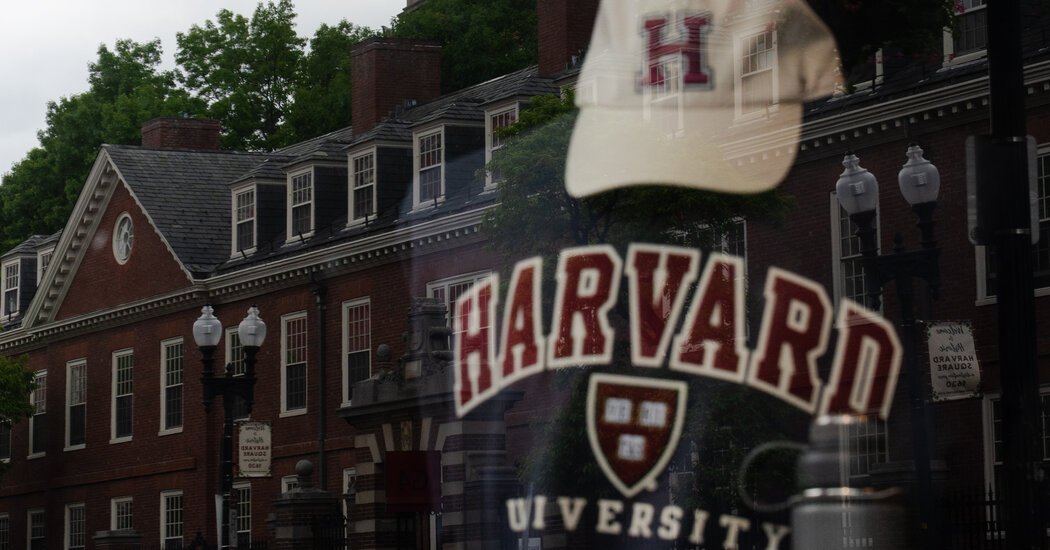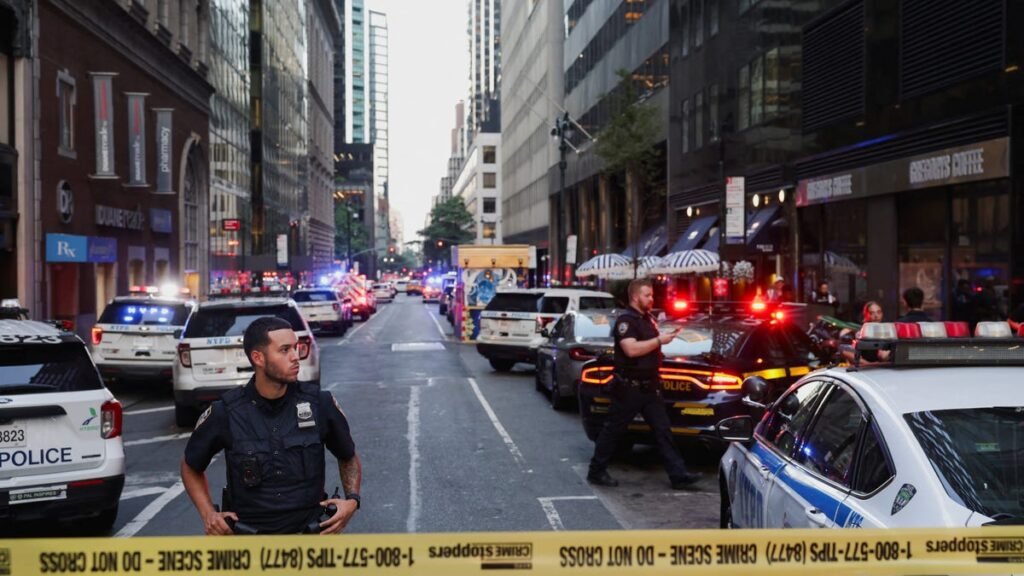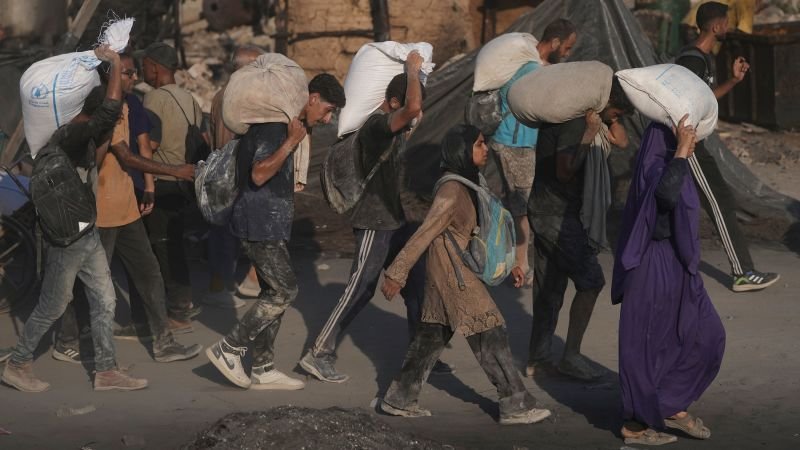Now Reading: Trump Administration Live Updates: Latest News on Harvard, Travel Ban and More
-
01
Trump Administration Live Updates: Latest News on Harvard, Travel Ban and More
Trump Administration Live Updates: Latest News on Harvard, Travel Ban and More

Somewhere inside Camp Lemonnier, an American military base in the East African nation of Djibouti, eight men, all convicted of serious crimes in the United States, are under the guard of officers from the Homeland Security Department.
The Trump administration had planned to send the men, who had come to the United States years ago as immigrants from across the world, on to the war-torn country of South Sudan, an extraordinary gambit and part of President Trump’s broader plan for mass deportations. Then an order from a federal judge, on the other side of the planet in Boston, put a halt to the plan, at least for now.
And so for the past 16 days, the men have been in limbo, living and sleeping inside a modular, air-conditioned container that the military usually uses as a conference room. Immigration and Customs Enforcement officers have the detainees under “constant surveillance,” accompanying them on their trips to the bathroom and then searching them for contraband when they return, a D.H.S. spokeswoman said.
The detainees’ fate has emerged as a key test in the constitutional battle over the scope of due process. The White House is making a bold claim, arguing that handing immigrants a one-page document is sufficient to deport them to a dangerous country to which they have no previous connection.
A reconstruction of the men’s surreal journey from South Texas to Camp Lemonnier reveals a chaotic effort by the Trump administration to make an example of a group of immigrants the administration has termed “the worst of the worst.” At first, the detainees were told that they were going to be sent to South Africa, but hours later were told it would be South Sudan instead. What was to happen to them next — whether they were to have been imprisoned or set free — is unclear.
The judge, Brian E. Murphy of the District of Massachusetts, found that D.H.S. had given the men less than 24 hours’ notice before they were deported, in violation of a court order that migrants in their position be given a “meaningful opportunity” to voice a reasonable fear of torture.
Top military leaders at U.S. Africa Command were provided little more than a day’s notice that D.H.S. would be using one of their overseas bases as a way station for an immigration enforcement operation, according to a military official briefed on the matter.
The case has implications that could extend beyond the due-process rights of immigrants, according to Sarah Sherman-Stokes, a professor at Boston University School of Law.
“President Trump has floated the idea of sending people convicted of crimes out of the U.S., including American citizens,” she said. “What he’s trying now with the least sympathetic people, noncitizens who have been convicted of crimes, is a test of how much deplorable treatment and erosion of due process voters will stomach.”
To piece together the men’s story, The New York Times reviewed hundreds of pages of court and criminal records, and spoke with lawyers, officials and family members, as well as one detainee, still in custody, who was part of the group until officers pulled him aside before the plane departed. The Times also spoke with government officials with knowledge of the deportations who spoke on the condition of anonymity because of the sensitivity of the operation.
A homeland security spokeswoman emphasized the seriousness of the detainees’ crimes. She said Judge Murphy’s order that the eight men should remain in U.S. custody was to blame for the operation’s logistical challenges, as well as health risks facing the D.H.S. personnel tasked with guarding them.
For now, no one knows how long the men will be held in Djibouti, or where they might be sent next.
Ngoc Phan, the wife of one of the detainees, said she and her husband had already planned to return to Vietnam, his native country, this year.
A U.S. citizen, she acknowledged that her husband, Tuan Thanh Phan, who came to the United States from Vietnam at age 9, killed someone in a gang altercation when he was 18, leading to a 25-year prison sentence and an order from an immigration court to leave the United States. But he had completed his sentence, she said, and was now resigned to returning to the country of his birth.
Instead, the government’s attempt to send him to a country on the brink of civil war had landed him on a U.S. military base, “loaded onto a plane in the middle of the night to be disappeared somewhere,” she said.
“How is that OK?” she asked.
Bound for Djibouti
The journey that took the men to Camp Lemmonier began on May 17, when 10 men arrived at the ICE detention center in Port Isabel, Texas, near the border with Mexico.
They were strangers, according to Ahmer Shaikh, a detainee who remained with the group for the next two and a half days.
They came from countries around the world — Vietnam, South Korea, Mexico, Laos, Cuba, Myanmar. Only one was from South Sudan.
Court documents show that U.S. courts had convicted all the men of violent crimes; many had either finished or were about to finish serving their sentences. Mr. Shaikh, 57, a native of Pakistan, was sentenced to 20 years in prison for second-degree murder for his role in a fatal assault on a Virginia man.
They also had “orders of removal,” meaning the government had the legal authority to deport them.
At Port Isabel, Mr. Shaikh said in a phone interview, the men tried to make small talk. At the time, they believed they were being sent back to their home countries, he said, and so they shared plans for the lives they planned to build upon their returns.
Then, on May 19, three officers handed the men papers for them to sign and therefore acknowledge that they had been notified of their pending deportation — to South Africa.
Mr. Shaikh was shocked. In his mind, returning to Pakistan would have been hardship enough. He had lived in the United States for more than four decades and has a wife and three children, all American citizens.
Still, he said, “when I go to my home country, I do have at least a little bit of chance of survival.”
“I’ve never been to South Africa,” he said. “I don’t know what I’m getting into. I don’t know nobody in South Africa.”
Each member of the group refused to sign, Mr. Shaikh said, and the men were sent back to their quarters.
With that, the men became part of a lawsuit pending before Judge Murphy, who had issued an order that required the government to give “written notice” to any migrant facing deportation to a third country. They would then have a chance to voice a “reasonable fear” of torture. Then, if the government found that they had failed to demonstrate such a fear, they would have “a minimum of 15 days” to challenge the legality of their deportations in court.
But the actual process unfolded much faster.
“Guys, I’ve got good news for you and bad news for you,” an officer told the men that evening, according to Mr. Shaikh. “The good news is we are not going to deport you guys to South Africa. But we are going to deport you guys to South Sudan.”
Mr. Shaikh said the officer then informed them that he had not brought any papers notifying them of the removal, because he knew no one would sign them anyway.
That same evening, a lawyer for another one of the detainees, Nyo Myint, received two emails in quick succession from an ICE official in Texas, according to court records, with one-page forms stating that Mr. Myint, who was born in Myanmar, was being sent to South Africa, and then South Sudan. A line marked “signature of alien” was stamped “refused to sign.”
The form also stated that the officer had “served the alien a copy of this notice in person.” Mr. Shaikh said otherwise, recounting that the detainees were not provided paperwork about the change to South Sudan before they boarded the plane the following day.
D.H.S. did not respond to questions about the change in the men’s destination or the paperwork provided to them.
The next morning, May 20, Mr. Shaikh said, the men were loaded into a van and given new paperwork stating that they were being transferred to another immigration facility, in Louisiana. Instead, he said, they were driven to an airport.
Waiting on the tarmac was a Gulfstream V, a luxury long-range private jet owned by a charter company, according to public flight-tracking data that The Times was able to confirm using satellite imagery.
At that moment, Mr. Shaikh said, the men realized something was amiss.
“We all look in each other’s faces — we just look at each other,” he said. “Our faces just turned pale.”
As the others boarded the plane, Mr. Shaikh said, he and another man, an immigrant from South Korea, were pulled aside with no explanation.
“To this day, it’s a mystery,” he said. “Why? Why the two of us pulled out of that plane?”
He watched from the van as the plane took off.
‘Where Is the Plane?’
Before leaving Port Isabel, Mr. Phan had managed to call his wife. She alerted lawyers, who hurried to file an emergency motion for the judge to intervene. On the evening of May 20, Judge Murphy called a hearing to figure out what had become of the men.
“Where is the plane?” Judge Murphy repeatedly asked government lawyers.
“I’m told that that information is classified, and I am told that the final destination is also classified,” Elianis N. Perez, a Justice Department lawyer, replied at 6:06 p.m.
But by that time, the plane had already left U.S. airspace, according to a public flight-tracking website, bound for what was likely a refueling layover in Ireland.
At the hearing, Judge Murphy struggled to get information from the government about the rapidly evolving situation. Three times, he called a recess so Justice Department lawyers could try to get more information on the detainees’ whereabouts.
Finally, Judge Murphy said he would not order the plane to turn around but ordered the parties to reconvene the following morning, May 21.
At around 9:52 a.m. Eastern time that day, the Gulfstream landed at Camp Lemonnier, according to flight-tracking data.
A little more than an hour after the plane landed, Judge Murphy took the bench in Boston and announced that he believed the government had violated his order by giving the detainees so little notice before trying to deport them to South Sudan.
“It was impossible for these people to have a meaningful opportunity to object to their transfer to South Sudan,” he said.
At first, the government declined to disclose to Judge Murphy where the detainees had ended up.
“They’re sitting on a plane,” a D.H.S. official told the judge, explaining that their whereabouts was deemed too sensitive to discuss in open court.
The next day, in a social media post, Mr. Trump announced that “EIGHT of the most violent criminals on Earth” “remain in Djibouti.”
Mr. Trump’s post included an image showing mug shots of the men, their full names and the crimes for which they had been convicted.
It was a different situation than one in March when the administration had deported more than 200 Venezuelans, many without criminal convictions, to a prison in El Salvador. This time, the deportees had convictions for at least three murders, two attempted murders, two robberies and two sex crimes between them.
One of the men convicted of murder, Mr. Phan, had shot and killed a 19-year-old, Michael Holtmeyer, during a fight in a parking lot next to a fishing pier in Tacoma, Wash., in 2000. According to a police report, Mr. Phan, who was 18 at the time, said he “just shot into the crowd.” He pleaded guilty but said in court that he had acted in self-defense.
“I do not understand why Phan, or anyone like him should continue to have rights,” Mr. Holtmeyer’s mother wrote to the court in a victim impact statement then.
Still, Gerald Horne, the deputy county prosecutor who helped convict Mr. Phan, said in an interview that the attempt to send Mr. Phan to South Sudan “appears to me to be a sentence after his sentence.”
Despite the gravity of his crime, he said, Mr. Phan still deserved “some form of due process.”
At the hearing, Judge Murphy agreed, telling the government it could either fly the detainees back to the United States or figure out a way to set up interviews in Djibouti where the men would be given the chance to object to their deportations. Either way, he ordered that they remain in U.S. custody and be given access to a phone so they could contact their lawyers.
The military, now realizing that detainees would be on their base overnight, refused to take primary responsibility for guarding and housing them, a military official said.
Eleven ICE officers now guard the men, working 12-hour shifts in the face of risks to their health, according to a court filing by an ICE official. There are only six beds to be shared among the guards and two ICE officers who support the medical staff. Because they had not anticipated a long stay, they were not able to prepare for the trip by taking antimalarial medication. Some had fallen ill after exposure to smog from burn pits used by the military to dispose of waste.
D.H.S. agreed to set up the hearings on the base. “It is possible to do it,” Marcos Charles, an ICE official, told the court on May 21. “We’re going to have to look at how long it would take us to get it done.”
On Monday, D.H.S. said in a court filing that it had set up an interview room where the detainees could meet remotely with their lawyers, and had now provided them access to a satellite phone. But on Thursday afternoon, a lawyer for the men said her team had not yet heard from them.
Even as the Trump administration said it was taking steps to comply with Judge Murphy’s order, it was also going over his head. On May 27, it asked the Supreme Court to intervene and allow it to send the detainees to South Sudan. The court could rule at any time.
On social media, the administration blamed Judge Murphy for the deteriorating conditions, saying it was “outrageous” for him to put the “safety of law enforcement officers at risk for the sake of criminals.” The post did not mention that the administration had the option of bringing the men back to a detention center in the United States.
Mr. Shaikh remains in immigration custody, where he said he wondered about the fate of the eight men whose lives crossed briefly with his own.
“I think about those eight men every day,” he said.
On Wednesday afternoon, Ms. Phan received a phone call from her husband. “He sounded exhausted and said he can’t eat,” she wrote in an email.
The men wear shackles on their ankles, he told her. They are allowed to take them off every other day, when they use the shower, and have been told they will now be allowed a five-minute phone call to family every three days. He said that the guards were treating the detainees decently, but that everyone remained confused about why they were there in the first place.
“My husband wants to be deported back to Vietnam,” she wrote. “I am hoping that can happen.”
Reporting was contributed by Julie Tate, Zolan Kanno-Youngs, Riley Mellen, Carol Rosenberg and Alain Delaquérière.

















































